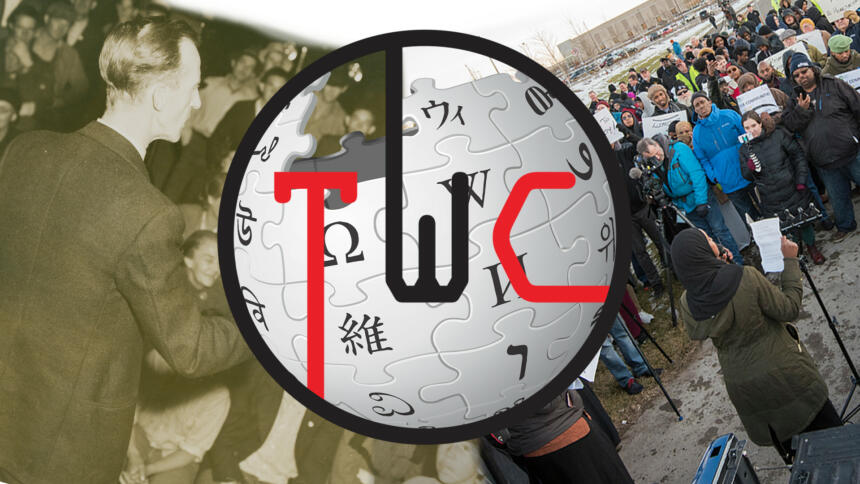The Tech Workers Coalition (TWC) helps workers in the technology sector with organizing, in the German case especially with setting up works councils. To prevent historical and current initiatives in this area from being forgotten, TWC is now organizing an edit-a-thon on Wikipedia. We speak with Yonatan Miller, founder of TWC Berlin, about the project.
netzpolitik.org: To start off – what is the Tech Workers Coalition and what does it aim to do?
Yonatan Miller: The Tech Workers Coalition was started in 2014 in the United States – specifically in the Bay Area and Silicon Valley – and in recent years it has expanded globally. We now have chapters in Italy, in India, the United Kingdom and in Germany.
In the US, TWC was envisioned specifically as a Worker’s Center, so something that is not a union, but geographically based. Worker’s Centers usually exist for areas that are hard to unionise, and high tech or IT is definitely one of those.
I generally would envision TWC as the first entry point for someone who’s maybe not familiar with the labor scene. Especially in Germany, it’s quite complicated. You have so many different acronyms and then acronyms of acronyms. I think of TWC as the landing page of the labor scene.
netzpolitik.org: And has it worked that way so far? How long have you been active, how big is the organisation in Berlin?
Yonatan Miller: I’ve personally been living in Berlin for the past five years. TWC was founded in June 2019 and at our first meeting we had 30 people come, and since then we’ve had between 20 to 40 people come to our monthly meetings. And then we have trainings. The largest training we had was one on how to form a works council, with about 50 people attending. Accumulatively, I think we’ve had several hundred people over the past year, even during Corona, during the Zoomification of meetings.
“Was this a waste of time?”
netzpolitik.org: And do you know how many of those people who were at the trainings actually went on to found works councils?
Yonatan Miller: This was a very big question for us as well, because we had this kind of training and it was like, now what? Was this a waste of time? Did we scare people away, maybe?
N26 was the most prominent case where people founded a works council after attending one of our trainings. Then we have smaller examples, like Cobot, which is a smaller co-working software agency that hosts many tech meetups in a Kreuzberg co-op space.
netzpolitik.org: You have the Berlin chapter so far. Are there any plans for TWC chapters in other cities in Germany?
Yonatan Miller: Leipzig is a very specific one we’re looking at. There are a couple of strategic reasons. It’s very close to Berlin and there is overlap in the trade union regional districts, for example IG Metall’s Berlin-Brandenburg-Sachsen. And then there is an Amazon fulfilment center at Leipzig/Halle Airport.
If you talk about southern Germany, you already have a quite institutional labor presence in manufacturing. That’s also a question for me: Would something like Tech Workers Coalition be useful?
netzpolitik.org: What has been your experience working with German unions?
Yonatan Miller: I personally am a member of IG Metall. Most of our members are either involved with ver.di, IG Metall or FAU. In the food courier section, we also have people involved with NGG.
“Most of the trade unions here in Germany understand the necessity of what we’re doing”
The trade unions in Germany understand the challenges with younger people and in the IT sector. So they’re happy that there is something like TWC, whether it’s collaborations through social media campaigns together or even attending our works council training.
So when people ask “What’s the difference between a works council and a union?”, we can actually literally point to them and say “Here’s a union secretary who will guide you through the process of forming of your works council.”
netzpolitik.org: So, good cooperation?
Yonatan Miller: Yeah, good cooperation.
netzpolitik.org: How does the international cooperation between the chapters in the Tech Workers Coalition work?
Yonatan Miller: We have our shared communication infrastructure and we host monthly international calls. We share monthly updates: when Kickstarter formed a union, that was the first tech union in the US, that was a monumental moment – to other things like the Alphabet union, which has international significance. And there’s also discussing specific topics, for example caste discrimination in tech.
You’ll have a reading group in New York and in San Diego, and then one for the Indian farmers’ protests in Berlin, along with people from our Bangalore chapter who are at the farmers’ protests. There are many crossovers between the different cities on these issues.
netzpolitik.org: Do you have contact to labor representation further up the supply chain, with unions in phone or microchip factories, for example?
Yonatan Miller: This is one of the challenges. The Tech Workers Coalition predominantly attracts white-collar workers who are mostly, but not exclusively, office based.
For the hardware supply chains, we talk about the Cobalt mines et cetera, but we don’t have very good contacts. And that’s something that has to change. I’m learning more and more as I look into the global supply chains. It’s not just that someone hasn’t thought about it, but that it’s really hard.
netzpolitik.org: Do the contacts to the big trade unions help there?
Yonatan Miller: One thing that we’re starting to learn more and more about is global union federations. They have a kind of legal, a political overview of 150 plus countries. That is difficult for a person who doesn’t know their co-worker, necessarily, in their own workspace, to start thinking about.
This is one hope I have for the Wikipedia edit-a-thon: There are enough prominent, public cases of tech organizing, but if we want to have this broad definition or understanding of tech organizing, it also needs to be reflected in the literature.
Wikipedia as a medium is really appropriate for the scale of that complex information and for multi-language access. Not everyone you’re speaking to might necessarily speak English, and they might have a local language of a specific country. French would be a Lingua Franca which I don’t know, but it’s an important language if you want to talk about global politics. Whatever Orange or Teleperformance are doing, I couldn’t say in most cases because they’re mostly written about in French, even though those are global conglomerates.
netzpolitik.org: Your edit-a-thon will go from February 19 to 21. You want to improve articles related to labor organization in the tech sector on the English Wikipedia. First of all, what is an edit-a-thon?
Yonatan Miller: An Edit-a-thon is a short, intense period, where we commit finishing a project together and afterwards sharing the results. Because of Corona, it’s now online.
We have prepared a list of articles we want people to either make contributions to or create entirely new articles. And these are just suggestions, there are of course other topics people can do. After people sign up on the Wikipedia event, we can either provide assistance or answer questions and afterwards we can publish a broad overview.
It’s a great way to give people a sense of achievement. Almost everyone has read Wikipedia but very few people edit Wikipedia, this will be one way to flip that.
When people look on the internet for “What is a tech union?” or “What is an IT union?”, typically they find the Tech Workers Coalition. But I think some of this information would be better served and more resilient on Wikipedia.
“This is all quite historic.”
People should be able to find information on complex topics like works councils or changes in regulation.
Sometimes people think: If something is not on Wikipedia, it’s not important. That’s a fallacy.
In the recent years’ rush to talk about tech unions, there is also a risk where we kind of overshadow the historic moves towards these or past initiatives. Whether it’s IBM workers fighting against South African apartheid or IBM’s role in the Shoah to the challenges of IT outsourcing discourse in the 1980s – this is all quite historic.
netzpolitik.org: Why, do you think, is the representation of topics related to organized labor on Wikipedia so lacking?
Yonatan Miller: It’s probably twofold. Fundamentally, Wikipedia is an extremely biased platform. Anyone telling you otherwise is lying to themselves. The fact that the overwhelming majority of the editors are white cis young men doesn’t really fare well. And you’re also going to see a geographic bias, so US unions, for example, most of them at least have at least a Wikipedia page and some history.
But there’s very limited intersectional labor or a broad overview of international labor.
That is changing as more and more young people are getting interested in trade unions again, but there is no doubt that generally, globally, trade union memberships are down compared to twenty, thirty years ago and so it’s not a surprise that the interest that is reflected on Wikipedia is as well. I’m obviously trying to change that, but it’s an uphill battle.
“Digital unionism generally is quite new”
netzpolitik.org: Do you think trade unions have so far had an interest in promoting the representation of labor topics on Wikipedia?
Yonatan Miller: This may be a little controversial, but I also don’t think it’s a secret, especially when we talk about German labor: I think there is sometimes a very traditional way of doing things, you know, you have your newspaper and brochure. Digital unionism generally is quite new, being active on Telegram or having TikTok channels for example.
Something like Wikipedia is chaotic, it’s not something that you can control. Literally anyone can revert all your edits, it’s definitely not a highly curated platform. Wikipedia is also not meant to be used as an advocacy platform; it’s not meant to make things right that are wrong in the world. But I think there is enough reliable secondary information that would be beneficial to the labor movement.
netzpolitik.org: Conflict-of-interest editing on Wikipedia is a difficult topic, but it will always happen. I think unions could come in there and say: “Okay, we obviously have a conflict of interest because this is the thing that we stand for, but still we think you can profit from us.” Just the picture archives from the big unions would be amazing for Wikipedia.
Yonatan Miller: I completely agree, I think archives could help a lot and I think it’s one very powerful avenue to also highlight your own accomplishments.
My hope would also be that the image union workers is not going to be exclusively restricted to the construction worker with that hat in a black and white vintage photo. That’s part of it, but it’s not the only thing.
netzpolitik.org: I recently looked up something on Commons, there were high quality, color photos. Then I looked for something union-related – instantly black and white photos from a hundred years ago.
Yonatan Miller: Nothing happened since then. Was a nice idea.
netzpolitik.org: One last question: Will you continue working on labor coverage on Wikipedia afterwards?
Yonatan Miller: Absolutely. I think especially during the Corona pandemic interest in labor has surged and I think we have a responsibility – I think this is one of the most important projects that is happening now.
I think it’s pretty great that we have a team of people across the world who are helping each other, whether it’s about editing Cambodian trade unions or about the history of the solidarity fist. That’s really fantastic.





0 Ergänzungen
Dieser Artikel ist älter als ein Jahr, daher sind die Ergänzungen geschlossen.